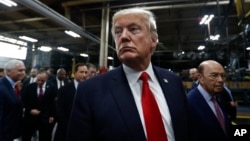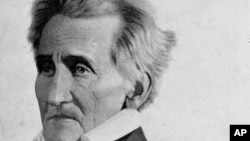U.S. President Donald Trump, in an interview Monday, asked why the Civil War, one of the country’s seminal events, occurred in the 19th century.
The history of the bloodiest war on U.S. soil is taught to school children across the country, but Trump remarked, “People don’t realize, you know, the Civil War, if you think about it, why? People don't ask that question, but why was there the Civil War?
“Why could that one not have been worked out?” Trump said in the interview with the satellite radio carrier Sirius XM.
The U.S. Civil War, often called the War Between the States, was fought from 1861 to 1865, largely over the issue of slavery, with 11 southern states, where plantation masters owned slaves brought from Africa to work their fields, seceded from the United States in opposition to free northern states without slavery. The war ended with the defeat of the Confederate southern states and freedom for the slaves.
But the issues over civil rights for African-Americans resonated for a century into the 1950s and 1960s, when blacks were granted full voting rights and legally, racially segregated schools were outlawed, but often only after bloody street clashes.
To this day, questions of racial equality play an important role in American public life and its national political scene, all stemming from the history of the Civil War.
Trump made his Civil War comments as he compared his presidency to that of Andrew Jackson, a rough-hewn 19th century populist whose rise to power as the seventh U.S. president bears some resemblance to Trump’s unexpected ascendancy to the White House in his upset victory last year to become the 45th U.S. leader. But Trump, who earlier this year placed a wreath at Jackson’s grave site in the state of Tennessee and hung a picture of him in his office, seemed ill-informed about the timing of Jackson’s life.
“I mean, had Andrew Jackson been a little later, you wouldn’t have had the Civil War,” Trump claimed about the president who at his death owned 150 slaves. “He was a very tough person, but he had a big heart. He was really angry that he saw what was happening with regard to the Civil War. He said. ‘There’s no reason for this.’”
But Jackson, who was president from 1829 to 1837, died in 1845, 16 years before the Civil War erupted.
Trump, who over the weekend marked his first 100 days in office of his four-year term, has sat for a number of interviews in recent days to tout his accomplishments.
He has claimed that no president has accomplished more than he has in the first months in office, although Congress has yet to approve his bid to repeal the national health care reforms that were the signature legislative achievement of his predecessor, former President Barack Obama, and U.S. courts have blocked his efforts to curb immigration from majority-Muslim countries.
Trump won Senate approval for a new conservative justice on the Supreme Court, Neil Gorsuch, and has asserted new American military might overseas, launching missile attacks on Syria within days after a chemical weapons attack on civilians in Syria and dropping the biggest non-nuclear bomb ever on an Islamic State hideout in Afghanistan.
But Trump continues to face questions about his debunked claim that Obama wiretapped his Trump Tower headquarters in New York during the presidential campaign.
In an interview Monday with CBS News in the Oval Office of the White House, Trump was asked whether he still stood by the wiretapping claim, which U.S. national security officials and congressional investigators have said did not occur.
“I don't stand by anything,” Trump said, then adding, “I just-- you can take it the way you want. I think our side's been proven very strongly. And everybody's talking about it. And frankly it should be discussed. I think that is a very big surveillance of our citizens. I think it's a very big topic. And it's a topic that should be number one. And we should find out what the hell is going on.”
CBS journalist John Dickerson, then asked, “I just wanted to find out, though. You're-- you're the president of the United States. You said (Obama) was 'sick and bad' because he had tapped you-- I'm just—"
Trump responded, “You can take-- any way. You can take it any way you want…. I have my own opinions. You can have your own opinions.
Moments later, Trump abruptly ended the interview, saying, “Okay, it’s enough. Thank you. Thank you very much.”





